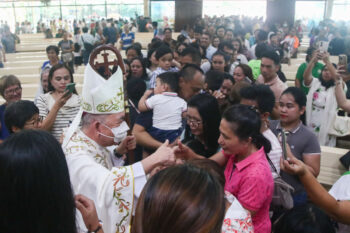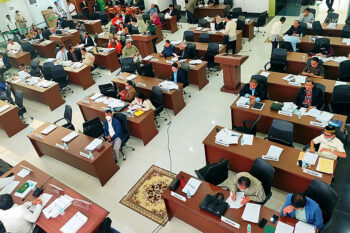This article discusses the different reference points that may be used to look at the impact and effectivity of PCVE programs in the Philippines that are implemented by state and non-state actors. The discussion revolves around how one can use reference points to understand the depth and effectivity of these programs to the actors involved in the program.
Introduction:
The Philippines now is in the eye of the storm of violent extremism in Southeast Asia, being the venue of one of the recent attacks of violent extremism (Zamboanga and Marawi Siege, 2013 and 2017 respectively), the country joins other countries that have fallen victim to this scourge.
Violent extremism is one of the most pressing challenges to countries around the world. This presents issues within governance, peace and development as well as
national security concerns, not to forget the importance of engaging state and non-
state actors as such that there is a need to have reference points for looking at effectivity of PCVE programs.
In order to be able to say that a PCVE program is effective, allow us first to adopt a working functional definition of Violent Extremism within a Philippine context. “Violent extremism on the other hand is the phenomena wherein individuals or groups undergo a psychological process wherein they arrive at a point where they will engage in violence in the accomplishment of their political or ideological goals. This can be said to be having six elements:
- Anti-state perspective
- Narrow perspective and worldview, reflected by the vertical type of thinking exhibited by many members of VE groups.
- Perceived ideological enemies
- Narrative of oppression arising from a series of factors which are push factors.
- Justified use of violence against perceived ideological enemies[i].”
Based on this working definition, the context is that for a program to be successful in PCVE there must be an active attempt to be able to shift the focus of perception or thinking of individuals who have this mindset, which is in the language of DSSP (Development Support and Security Plan) Kapayapaan, “Winning Hearts and Minds.” In short for a PCVE project to be successful, it should be able to incorporate values of multiculturalism, respect of others cultures, beliefs and perspectives and a welcoming attitude towards diversity.
National policy and perspective
In order to have a framework from where to appreciate initiatives in PCVE in the country, one has to look at the existing national policy and perspectives in the context of governance, peacebuilding and security. These are reflected primarily in the current National Security Policy and the National Security Policy which were formulated by the National Security Council and the DSSP Kapayapaan.
Among the important key objectives of the National Security Policy[ii] is to fulfill this national vision and safeguard the national interests which include, among others, the protection of the people, their ways of life, welfare and well-being; strengthen the country’s democratic institutions, safeguard its territorial integrity and sovereign rights; and enhance the Philippines role and image as a strategic partners of the international community. This is reflected in the National security strategy[iii]which mandates that the fulfillment of the following specific action areas will help attain the above national vision. Among those relevant to PCVE are:
1. Guarantee Public Safety and Achieve Good Governance.
2. Mitigate the Impact of Health-Related Threats.
3. Develop a Dynamic, Inclusive, and Sustainable Economy.
4. Achieve Food and Water Security.
5. Safeguard and Preserve National Sovereignty and Territorial Integrity.
6. Heighten Consciousness and Pride on Filipino Heritage, Culture and Values.
7. Promote Human and Ecological Security
8. Achieve Energy Security. Energy security is the uninterrupted availability of energy sources to all households and economic sectors throughout the country at an affordable price.
9. Ensure Maritime and Airspace Security.
10. Strengthen International Relations.
11. Provide Strong Cyber Infrastructure and Cyber Security.
12. Improve Vital Transportation Infrastructure and Port Security.
In the words of then Armed Forces of the Philippines Chief of Staff and now OIC Secretary of the Department of Interior and Local Government (DILG) Eduardo Ano, “the strategic imperatives of the DSSP Kapayapaan[iv]on the other hand, focus on destroying terrorist groups in the Philippines as well as giving emphasis to the peaceful settlement of peace-inclined threat groups like Communist Party of the Philippines/New People’s Army/National Democratic Front (CPP/NPA/NDF), Moro Islamic Liberation Front (MILF) and Moro National Liberation Front (MNLF). In addition, it aims to contribute to nation building, provides active support in Philippine National Police (PNP) and law enforcements in war on drugs. He elaborates: “The expanded purpose of DSSP Kapayapaan is linked with national vision and development plans of the national government.”
With these as the references to the National policy on PCVE, it is clear that any program in this regard should be able to address these concerns reflected in the National Security Policy and National Security strategy and DSSP Kapayapaan.
How do we see from different levels that PCVE programs have taken effect and have resulted to positive impact?
Impact on a personal level of beneficiaries and participants to PCVE programs
Part of the key indicators for measuring the impact on a personal level are behavioral and perceptional changes. This is reflected on how they personally engage, appreciate and respond to differences of opinion, belief and attitudes of individuals, organizations and groups that have different perspectives from them.
Among the most observable may be their words and their actions. One good indicator would be less animosity and animosity with a more welcoming attitude towards people of other beliefs and perspectives.
An example of this this can be demonstrated by subjecting such a person with other individuals who may have contradictory opinions or beliefs. If a person formerly is unwelcome to different perspectives and thinks predominantly that he or his group are the only ones who are correct or bringing the correct understanding and interpretation of religion or politics and that all other are misguided, and after engaging in a PCVE program this person gradually has a different perspective and has become welcome to alternatives and different ideas then there is in a way marked impact on the person. This would also include retractions of previous positions by way of speeches and articles.
Impact on an organizational level
To determine the impact to organizations of PCVE, this can be evaluated on the level of organizational dynamics – how their organization has changed on the level of policy and engagements to those that they organizationally engage, appreciate and respond to differences of opinion, belief and attitudes of individuals, organizations and groups that have different perspectives from them.
A demonstrative example is operationalizing interfaith and intrafaith initiatives. One of the best indicators if PCVE programs have significant effects on organizations is the openness and acceptability of collective work and engagement with others for groups that are highly exclusivist and maintain a pro-extremist perspective after engaging in PCVE initiatives. This will show that on a policy and operational level these organizations have already accepted the concept of working with others as equals and peers.
Part of the expected changes in policy and engagement of these organizations would be the decrease in release or encouragement of hate speech against other groups, or decrease in anti-state and anti-system discourse and the usage of more constructive discourse for social change and transformation (i.e, instead of focus on using the discourse of violence against enemies, the focus would be more on changing mindsets and network building for social change). Part of this also would be organization policies that are aimed to correct previous actions and positions that run counter to multiculturalism and respect for diversity and inclusivity.
Impact to government agencies.The impact of a PCVE program operates on several levels:
- For law enforcement, security sector and policy offices it would provide a more profound and correct assessment and understanding of violent extremism. It will allow these agencies to correctly identify threats, assess the potential jump over of groups from simple radicalism to violent extremism, and properly arrest individuals and groups before they conduct acts of violence against people and communities, adoption of correct policies to address violent extremism and create scenarios which would discourage individuals or groups to be recruited, adopt or engage in violent extremism. Agencies that conduct rehabilitation of offenders would engage in more behavioral centric approaches to change perceptions among VE inmates.
- For agencies who are engaged in governance, correct appreciation of PCVE would mean that there are more multi-stakeholder approach programs that would directly address socio-economic ills or programs that aim to minimize social anger, this can be done by enhancing the Conditional Cash Transfer of DSWD to directly target lower income bracket families and families of incarcerated VE offenders.
- For agencies engaged in education and training, they would ensure that values that promote multiculturalism respect and diversity through educational and training content.
- For agencies that engage in legislation, they would pass laws that would become policies that would address the blank spaces in the government’s approach in addressing violent extremism.
Impact to the community
Determining the impact of a PCVE project or program to a community can be seen in how it responds to its previously set values or practices as a community. This collective response would either affirm values that are expressed by multicultural and culturally inclusive communal dynamics. This would imply lesser community and religious conflicts and the lessening of biases, this would also note an increase of CSO-government collaboration and partnerships in the interest of governance, peacebuilding and public safety.
Among the possible demonstrable aspects of the positive impact of PCVE programs would take the form of active participation in community watch being, vigilant against external actors who aim to incite violence and conflict in their communities, stronger community-government collaboration in crafting more policies that manifest inclusive governance like having culturally sensitive consultative bodies like Muslim Consultative office, or Indigenous Peoples Council of leaders, Strong participation of women in community governance, peacebuilding and public safety issues. Welcoming attitude to different groups that have diverse perceptions and beliefs but vigilant against organizations that may incite or propagate hate and violence against others.
Looking forward
As the country is one of those that have a strong commitment to address the threat of violent extremism, it is important to note that there is an impending need to evaluate the ongoing PCVE projects being conducted by International Non-Government Organizations, programs done by regional and local NGOs funded by international donors, or CSOs that implement PCVE programs in partnership with these groups and assess the impact that the PCVE programs these groups do in relationship with the National policy on peace and security and relating the government’s efforts in PCVE. An assessment of their impacts can help government see the gaps and possible policy adjustments to address violent extremism.
(Yusuf Morales is a commissioner at the National Commission on Muslim Filipinos, and was formerly the Muslim and IP Concerns coordinator and a current consultant for the Ateneo de Zamboanga University , he sits as one of the Board of Advisers of the Al Qalam Institute for Muslim Identities in Southeast Asia at the Ateneo de Davao University. Cuurently a visiting lectuer at the different Uniformed service training institutions in the Philippines Commissioner Morales is one of the leading PCVE practitioners in the country, Commissioner Morales has extensively written and conducted trainings on PCVE and together with other PCVE practitioners continue to assist and help the Philippine government understand this current challenge)
[i]“Peacetalk: Reflecting over multi-stakeholder participation and engagement over PCVE”. Morales, Yusuf. Published on Mindanews, Sep 23, 2018 https://mindanews.com/mindaviews/2018/09/peacetalk-reflecting-on-multi-stakeholder-participation-and-engagement-over-pcve/accessed 4 October 2018
[ii]http://maritimereview.ph/2018/07/27/national-security-policy-2017-2022/
[iii]https://news.mb.com.ph/2018/07/08/national-security-strategy-2018/
[iv]https://dwdd.com.ph/2017/01/09/kapayapaan-afp-new-campaign-intends-to-destroy-terror-groups/







